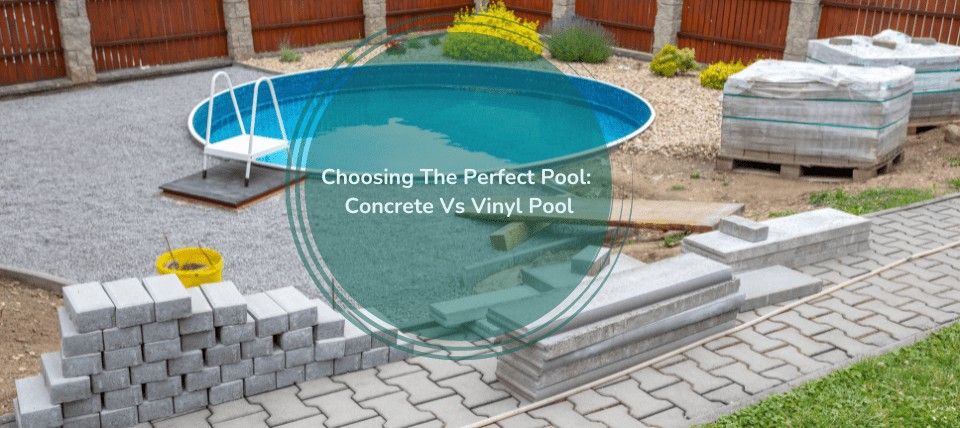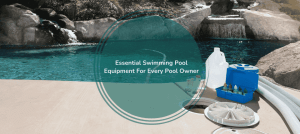A Comprehensive Guide to Your Ideal Aquatic Oasis
Concrete vs vinyl pool can be a challenging decision for anyone without sufficient knowledge. It’s essential to have a clear understanding of the benefits and drawbacks of each type of pool before making a decision.
Concrete vs vinyl pool can be a challenging decision for anyone without sufficient knowledge. It’s essential to have a clear understanding of the benefits and drawbacks of each type of pool before making a decision. At every step of the way, from customization to installation, we are here to guide you and help you make an informed decision that meets your needs. Our goal is to provide you with all the information you need to choose the best type of pool for your needs.
Concrete
Concrete or gunite pools are considered the best when it comes to customization. The reason behind this is that concrete can be molded in any desired shape, which allows you to customize your pool according to your preferences. Additionally, concrete pools are more accommodating when it comes to the installation of additional features, such as tanning ledges, due to their moldable nature.
On the other hand, vinyl liner pools are usually available in a standard rectangular shape. If you opt for a customized shape, it can cost you more.
If you are looking to experiment with designs and features, concrete pools are the way to go. They offer more flexibility and freedom in terms of customization, making them the best choice for those who want a unique and personalized pool.
Installation
If you’re planning to build a pool, it’s important to choose the right type of pool for your needs. Two popular options are concrete pools and vinyl pools. Concrete pools are known for their flexibility and ability to take on any shape or design. However, they can take a long time to install, often up to 3-7 weeks, which can be a downside if you’re looking for a quick installation. If you’re set on a concrete pool, it’s recommended to begin the process during the winter months to ensure that it’s ready for use by the summer.
On the other hand, vinyl pools are much quicker to install, taking only around a month to complete. This makes them a great choice if you want your pool ready in time for the summer season. While they may not offer the same level of flexibility as concrete pools, they are still customizable and come in a variety of sizes and shapes.
It’s important to note that concrete pools can last for many years and are known for their durability. Despite the longer installation time, they are a great investment if you’re looking for a long-lasting pool. Ultimately, the choice between a concrete pool and vinyl pool comes down to personal preference and needs.
Maintenance Cost
When it comes to swimming pools, concrete pools are known for their durability and strength. However, it’s important to note that they can be costly upfront and require regular maintenance over time. For instance, in addition to the initial cost, there are also expenses like chemical usage, replastering, and electrical usage that must be paid for every ten years.
Although concrete pools are incredibly strong, they are not impervious to damage. While vinyl pools may be more susceptible to damage from pets, concrete pools can still be scratched by furry friends. On the other hand, vinyl pools are less likely to endure wear and tear over time.
If you’re considering a concrete pool, it’s important to note that replastering is necessary every ten years. Additionally, waterline tiles may also need to be replaced over time. Both of these expenses can add up over time.
Lastly, it’s worth noting that concrete pools are not the best choice for those who want a saltwater pool. Salt and concrete don’t mix well, and saltwater can cause damage to the pool over time. Regular maintenance will be required if you choose to have a saltwater pool with a concrete pool.
Vinyl
Swimming pools are a great way to unwind and relax, especially during the summer months. When it comes to building a pool, one of the crucial decisions to make is choosing the right pool liner. Concrete and vinyl are the two most popular options available in the market.
Vinyl pool liners are a cost-effective option and can last for up to 5-9 years if installed correctly. However, they are not impervious to punctures and tears caused by sharp objects like branches or pet claws. While thick liners can provide minor protection, they cannot withstand everything.
On the other hand, concrete pools are more durable and can last for decades with proper maintenance. Replastering may be required over time, but concrete pools can withstand more wear and tear than vinyl liners.
The choice between the two types of pool liners ultimately depends on your usage. If you have pets or frequent guests, a concrete pool may be the better option due to its durability. However, if you are confident that your pool will not be subjected to any physical damage, a vinyl liner may be a more affordable choice.
Regular maintenance
As a pool owner, it’s important to be aware of the potential issues that can arise with the concrete surface of your pool. Algae is a common problem and can infiltrate the porous concrete, leading to an unsightly and unhygienic appearance. Removing algae requires the use of a steel brush and can be a difficult and time-consuming task that needs to be done every 3-4 weeks to keep your pool looking clean and inviting. In addition, if the concrete begins to chip, flake, or fall from the surface, replastering may be necessary to maintain the integrity of your pool.
Another issue that can affect the appearance of your pool is wrinkles in the liner. While wrinkles don’t impact the functionality of your pool, they can be unsightly and give the impression of neglect. To remedy this, some pool owners opt for liner botox, a professional service that can smooth out the wrinkles and restore the liner to its original appearance. Finally, divots and dents can also impact the appearance of your pool and may require repair to prevent them from turning into bigger problems such as hollow ditches.
Moving on to your pool’s arch nemesis: Algae Pool owners need to be aware of the problem of algae deposition in their pools. This can be particularly problematic for concrete pools, which are highly porous and therefore more likely to accumulate algae. In order to prevent this from happening, concrete pools need to be cleaned every 3-4 weeks. However, it’s important to note that even vinyl pools, which are less porous than concrete pools, are still prone to algae deposition. This is because the submerged areas in the liner tend to attract algae. Therefore, it’s important for pool owners to take proactive measures to prevent algae buildup and maintain the cleanliness of their pools.
The pool chemistry – concrete vs vinyl pool
It is important to note that concrete pools are not compatible with salts of any kind. This is because they tend to leech alkalinity into the pool, which requires the use of heavy chemicals to balance the pH levels. In order to ensure proper circulation of these chemicals, it is often necessary to install heavy pumps and filtration systems in the pool.
On the other hand, vinyl pools do not leech alkalinity into the pool, and therefore do not require the use of heavy chemicals. However, it is still important to maintain the pH level, alkalinity, and other factors to keep the pool in good condition.
When deciding between the two, your priorities will play a key role in determining which pool is the best fit for you. If you’re looking for aesthetics, pool parties, and Instagram-worthy photos, one pool might be more suitable for you than the other. If you prioritize design, longevity, and durability, concrete may be the better option.





